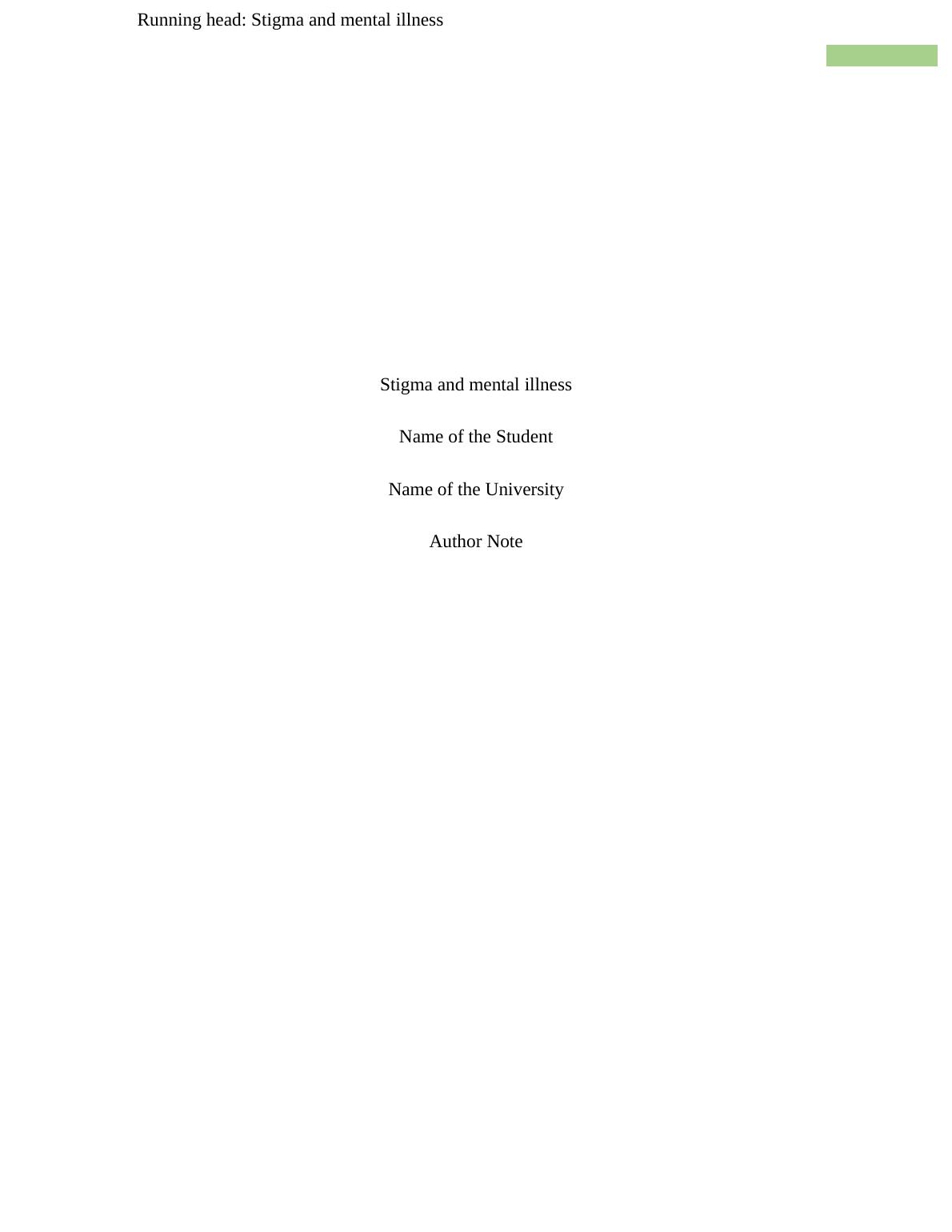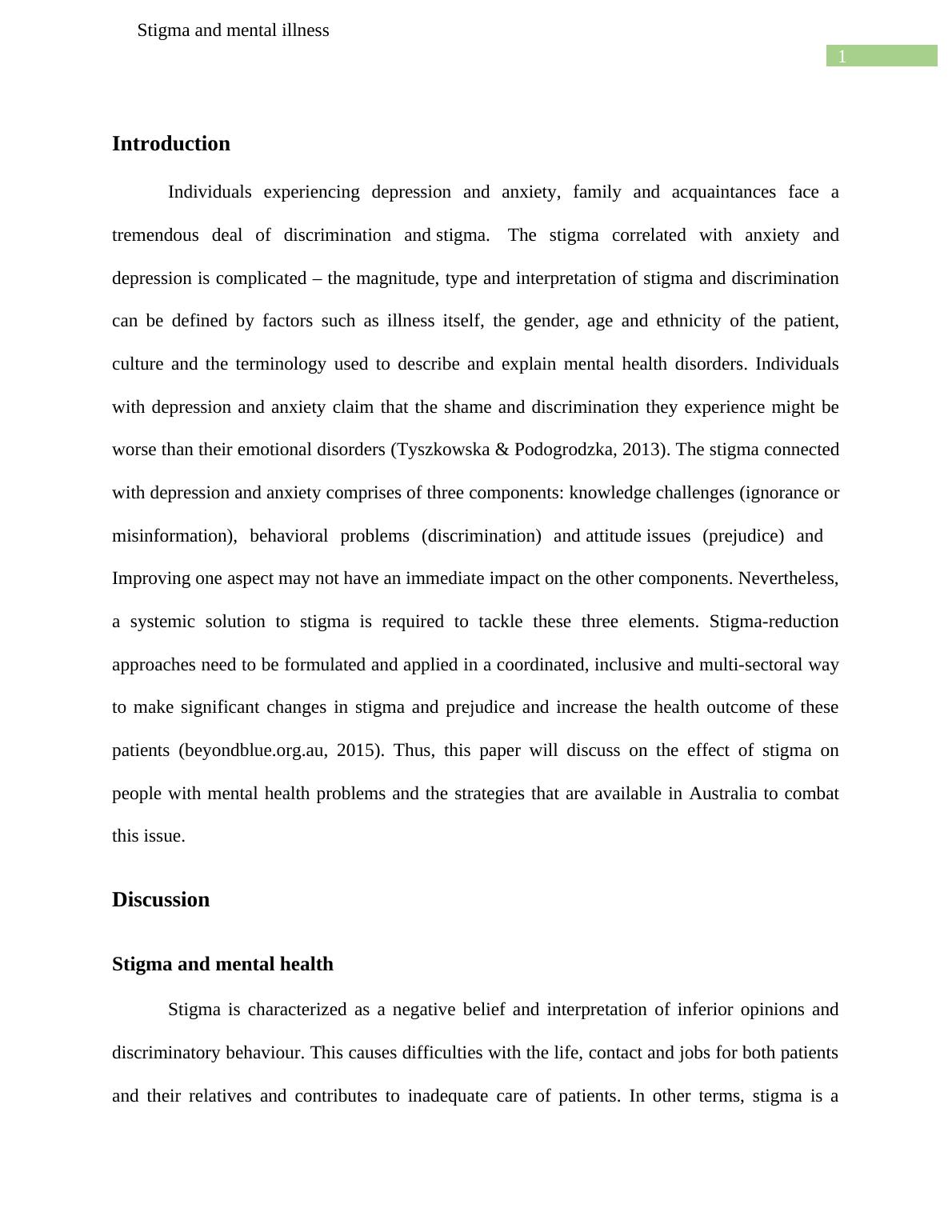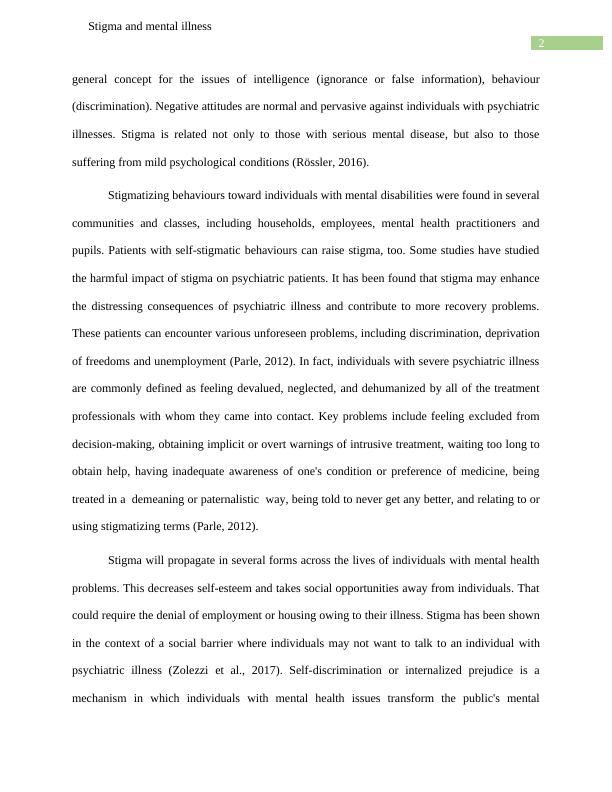Stigma and mental illness Report 2022
Added on 2022-09-25
9 Pages2225 Words27 Views
Running head: Stigma and mental illness
Stigma and mental illness
Name of the Student
Name of the University
Author Note
Stigma and mental illness
Name of the Student
Name of the University
Author Note

1
Stigma and mental illness
Introduction
Individuals experiencing depression and anxiety, family and acquaintances face a
tremendous deal of discrimination and stigma. The stigma correlated with anxiety and
depression is complicated – the magnitude, type and interpretation of stigma and discrimination
can be defined by factors such as illness itself, the gender, age and ethnicity of the patient,
culture and the terminology used to describe and explain mental health disorders. Individuals
with depression and anxiety claim that the shame and discrimination they experience might be
worse than their emotional disorders (Tyszkowska & Podogrodzka, 2013). The stigma connected
with depression and anxiety comprises of three components: knowledge challenges (ignorance or
misinformation), behavioral problems (discrimination) and attitude issues (prejudice) and
Improving one aspect may not have an immediate impact on the other components. Nevertheless,
a systemic solution to stigma is required to tackle these three elements. Stigma-reduction
approaches need to be formulated and applied in a coordinated, inclusive and multi-sectoral way
to make significant changes in stigma and prejudice and increase the health outcome of these
patients (beyondblue.org.au, 2015). Thus, this paper will discuss on the effect of stigma on
people with mental health problems and the strategies that are available in Australia to combat
this issue.
Discussion
Stigma and mental health
Stigma is characterized as a negative belief and interpretation of inferior opinions and
discriminatory behaviour. This causes difficulties with the life, contact and jobs for both patients
and their relatives and contributes to inadequate care of patients. In other terms, stigma is a
Stigma and mental illness
Introduction
Individuals experiencing depression and anxiety, family and acquaintances face a
tremendous deal of discrimination and stigma. The stigma correlated with anxiety and
depression is complicated – the magnitude, type and interpretation of stigma and discrimination
can be defined by factors such as illness itself, the gender, age and ethnicity of the patient,
culture and the terminology used to describe and explain mental health disorders. Individuals
with depression and anxiety claim that the shame and discrimination they experience might be
worse than their emotional disorders (Tyszkowska & Podogrodzka, 2013). The stigma connected
with depression and anxiety comprises of three components: knowledge challenges (ignorance or
misinformation), behavioral problems (discrimination) and attitude issues (prejudice) and
Improving one aspect may not have an immediate impact on the other components. Nevertheless,
a systemic solution to stigma is required to tackle these three elements. Stigma-reduction
approaches need to be formulated and applied in a coordinated, inclusive and multi-sectoral way
to make significant changes in stigma and prejudice and increase the health outcome of these
patients (beyondblue.org.au, 2015). Thus, this paper will discuss on the effect of stigma on
people with mental health problems and the strategies that are available in Australia to combat
this issue.
Discussion
Stigma and mental health
Stigma is characterized as a negative belief and interpretation of inferior opinions and
discriminatory behaviour. This causes difficulties with the life, contact and jobs for both patients
and their relatives and contributes to inadequate care of patients. In other terms, stigma is a

2
Stigma and mental illness
general concept for the issues of intelligence (ignorance or false information), behaviour
(discrimination). Negative attitudes are normal and pervasive against individuals with psychiatric
illnesses. Stigma is related not only to those with serious mental disease, but also to those
suffering from mild psychological conditions (Rössler, 2016).
Stigmatizing behaviours toward individuals with mental disabilities were found in several
communities and classes, including households, employees, mental health practitioners and
pupils. Patients with self-stigmatic behaviours can raise stigma, too. Some studies have studied
the harmful impact of stigma on psychiatric patients. It has been found that stigma may enhance
the distressing consequences of psychiatric illness and contribute to more recovery problems.
These patients can encounter various unforeseen problems, including discrimination, deprivation
of freedoms and unemployment (Parle, 2012). In fact, individuals with severe psychiatric illness
are commonly defined as feeling devalued, neglected, and dehumanized by all of the treatment
professionals with whom they came into contact. Key problems include feeling excluded from
decision-making, obtaining implicit or overt warnings of intrusive treatment, waiting too long to
obtain help, having inadequate awareness of one's condition or preference of medicine, being
treated in a demeaning or paternalistic way, being told to never get any better, and relating to or
using stigmatizing terms (Parle, 2012).
Stigma will propagate in several forms across the lives of individuals with mental health
problems. This decreases self-esteem and takes social opportunities away from individuals. That
could require the denial of employment or housing owing to their illness. Stigma has been shown
in the context of a social barrier where individuals may not want to talk to an individual with
psychiatric illness (Zolezzi et al., 2017). Self-discrimination or internalized prejudice is a
mechanism in which individuals with mental health issues transform the public's mental
Stigma and mental illness
general concept for the issues of intelligence (ignorance or false information), behaviour
(discrimination). Negative attitudes are normal and pervasive against individuals with psychiatric
illnesses. Stigma is related not only to those with serious mental disease, but also to those
suffering from mild psychological conditions (Rössler, 2016).
Stigmatizing behaviours toward individuals with mental disabilities were found in several
communities and classes, including households, employees, mental health practitioners and
pupils. Patients with self-stigmatic behaviours can raise stigma, too. Some studies have studied
the harmful impact of stigma on psychiatric patients. It has been found that stigma may enhance
the distressing consequences of psychiatric illness and contribute to more recovery problems.
These patients can encounter various unforeseen problems, including discrimination, deprivation
of freedoms and unemployment (Parle, 2012). In fact, individuals with severe psychiatric illness
are commonly defined as feeling devalued, neglected, and dehumanized by all of the treatment
professionals with whom they came into contact. Key problems include feeling excluded from
decision-making, obtaining implicit or overt warnings of intrusive treatment, waiting too long to
obtain help, having inadequate awareness of one's condition or preference of medicine, being
treated in a demeaning or paternalistic way, being told to never get any better, and relating to or
using stigmatizing terms (Parle, 2012).
Stigma will propagate in several forms across the lives of individuals with mental health
problems. This decreases self-esteem and takes social opportunities away from individuals. That
could require the denial of employment or housing owing to their illness. Stigma has been shown
in the context of a social barrier where individuals may not want to talk to an individual with
psychiatric illness (Zolezzi et al., 2017). Self-discrimination or internalized prejudice is a
mechanism in which individuals with mental health issues transform the public's mental

End of preview
Want to access all the pages? Upload your documents or become a member.
Related Documents
Stigma and Mental Illness | Essaylg...
|5
|1006
|21
NS5331 Effective Clinical Governancelg...
|11
|2500
|40
Stigma Associated with Bipolar Disorder: A Cross-Sectional Studylg...
|4
|919
|111
Education about Mental Illnesslg...
|5
|901
|189
Prevalence and Impact of Stigma on Mental Healthlg...
|12
|2986
|80
Mental health in the communitylg...
|5
|1172
|51
